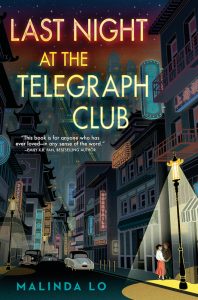Amazon Affiliate Link | Bookshop.org Affiliate Link
Growing up, I devoured books quickly and easily, but by high school, I started to lose interest in the books I found in bookstores or the library, jumping from book to book without finishing a single one. The problem, I determined, was that I was bored with reading about straight people all the time, and published books, as far as I could tell, were all about straight people. And then I found a list of YA books featuring LGBT+ characters, and I bought every book on the list, among them Huntress by Malinda Lo. I didn’t end up reading all of the books (genre still matters, among other things, even when LGBT+ books are scarce), but I loved Huntress, enough that it has been the book that, for me, represents the time in my life when I discovered that there actually were books about LGBT+ people, if you knew to look for them. Fortunately, now it is much easier to find those books, but my fondness for Malinda Lo remains, so when I first heard about Last Night at the Telegraph Club, her name excited me almost as much as the summary (and I love historical fiction, so that is saying something). Happily, it did not disappoint.
Last Night at the Telegraph Club centers around seventeen-year-old Lily Hu, a closeted Chinese lesbian living in San Francisco during the Red Scare. At school, Lily befriends another girl, Kath, with whom she begins to visit the Telegraph Club, a popular lesbian bar. As their feelings for each other deepen, Lily also has to contend with both the racism that could see her father deported, though he is legally an American citizen, and the knowledge that if her love for Kath were to be discovered, it would put both of them in danger.
Though Lo keeps this story firmly planted in history, she does so without it ever becoming either too grim or too rose-colored. The setting is fully realized, with timelines interspersed throughout the sections to further contextualize the events of the novel, and Lo does not shy away from depicting the racism and homophobia that Lily and the people around her face, ranging from microaggressions to being deported or disowned.
Despite all of this, Last Night at the Telegraph Club is full of love and levity. While it is true that a part of Lily is always disconnected from her environment, as the only lesbian she knows in Chinatown and the only Chinese girl at the Telegraph Club, the love she feels for her home and the freedom she experiences at the Telegraph Club matter just as much as the fear and the pain. Though Lo makes it clear that it is not easy to be Chinese, a lesbian, or a Chinese lesbian in this time or place, it is not simply a life of prejudice or hiding or suffering. She presents a multifaceted view of all parts of Lily’s identity, with a strong feeling of community and hope, and it is those aspects that make this novel really shine.
Perhaps what I loved most about this book was the relationship between Lily and Kath. I found their dynamic to be a breath of fresh air, both in this book specifically as well as in a more general sense. From the beginning, Lily and Kath clearly enjoy talking to each other. They ask each other questions about themselves and their interests, and they listen. As a reader, I never struggled to understand what they liked about each other, which, for me, is what really makes or breaks a romance. Their bond was real, a genuine connection that grew out of friendship more than anything else. They were sweet, and they were passionate, and I rooted for their happiness all the way through.
I know I am not the first reviewer to say this, but Last Night at the Telegraph Club is exactly the sort of book I was looking for in high school. It is a compelling historical fiction novel centered around a protagonist whose story so rarely gets told, but in Lo’s capable hands, no part of this feels unfamiliar. I was able to both see myself and learn where I did not, and when I finally closed the book, it left me feeling whole in the way that all my favorite books do. I cannot recommend it enough.
Trigger warnings: homophobia, racism, racial slurs, misogyny, miscarriage



